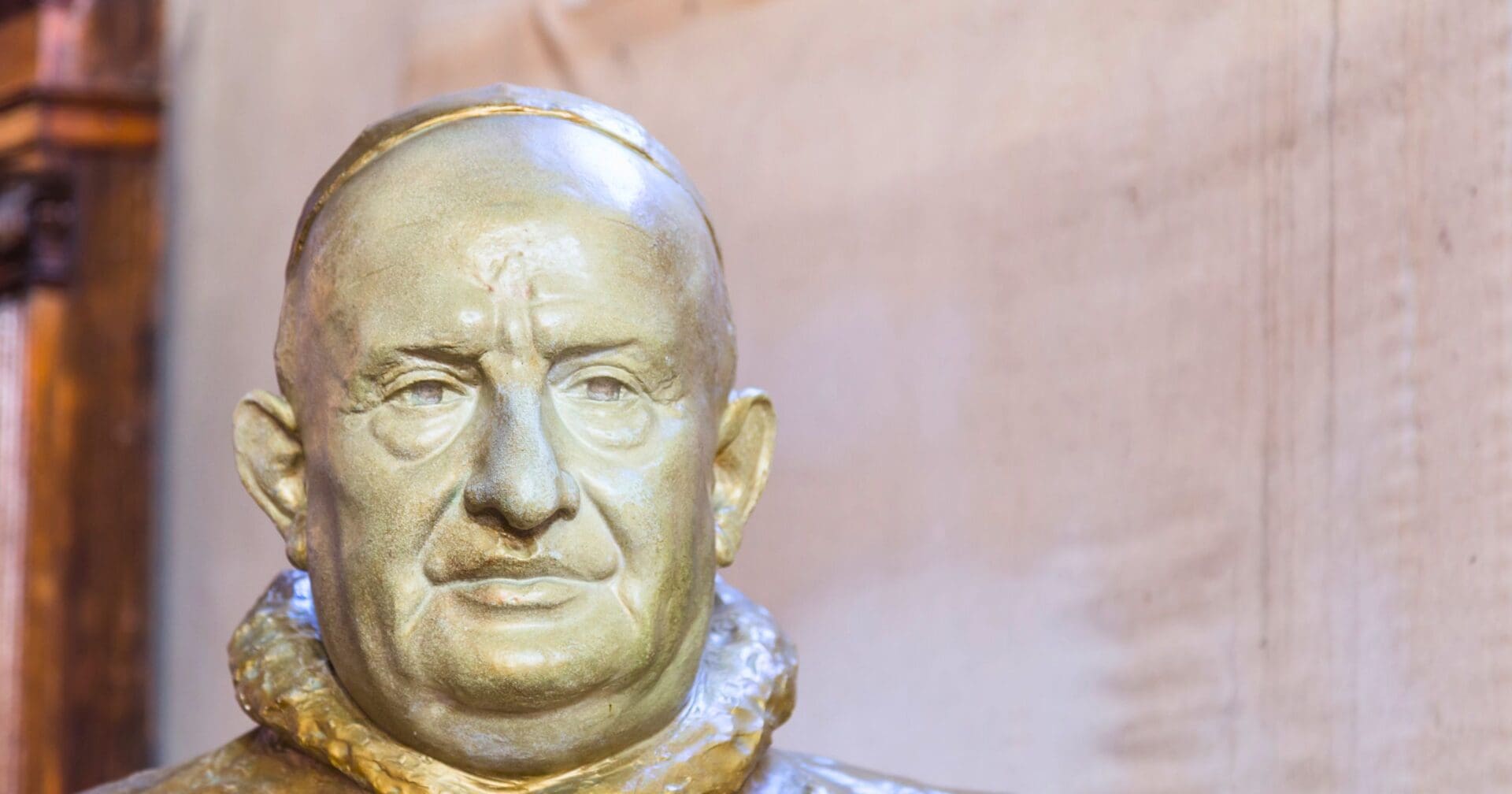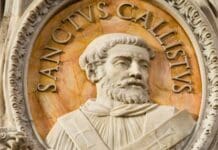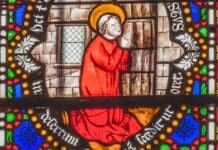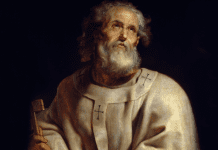Born Angelo Giuseppe Roncalli in Sotto il Monte on 25 November 1881, the future Pope Saint John XXIII was to leave an indelible mark on the Catholic Church and the world. His journey, from humble beginnings to leading the Church through a transformative council, showcases a life dedicated to service, faith, and love.
The fourth of thirteen children, Roncalli was baptized on the day of his birth. Under the mentorship of Father Francesco Rebuzzini, he cultivated a deep ecclesiastical foundation. He began his formal theological studies at the Seminary of Bergamo in 1892. During these formative years, he initiated a lifelong habit of spiritual notes, later compiled in the Journal of a Soul. In 1896, Father Luigi lsacchi introduced him to the Secular Franciscan Order, which he professed a year later.
His pursuit of higher studies took him to the Pontifical Roman Seminary between 1901 and 1905. Ordained in 1904, he soon became secretary to Bergamo’s Bishop Giacomo Maria Radini Tedeschi. This period was marked by fervent pastoral work, teaching, writing, and forging ties with saintly bishops like Saint Charles Borromeo.
As World War I raged, Roncalli served as a sergeant medic, and later as a chaplain for the military and students. His unwavering spirit was evident in his efforts to assist soldiers, provide spiritual guidance, and later, as spiritual director of the Seminary in 1919.
1921 ushered in a new chapter: his service to the Vatican. His roles varied from promoting missions in Italy to becoming the Apostolic Visitor to Bulgaria. Throughout his assignments, whether enduring natural calamities or navigating diplomatic intricacies, Roncalli’s ethos of “Obtedientia et Pax” (Obedience and Peace) shone through.
In the turbulent times of World War II, as Apostolic Delegate in Turkey and Greece, he championed interfaith dialogue and discreetly facilitated Jewish refugees’ escape. His subsequent role as Apostolic Nuncio in post-war France highlighted his diplomatic finesse and pastoral sensibilities.
In 1953, Roncalli was named the Patriarch of Venice. This pastoral role, which he cherished, brought him closer to his flock. However, destiny had grander plans. Elected Pope on 28 October 1958, he assumed the name John XXIII. His papacy, though brief, was transformative. Known as the “good Pope”, his encyclicals, Mater et Magistra and Pacem in Terris, were visionary. His magnum opus, the Second Vatican Ecumenical Council, set the Church on a renewed path.
In the hearts of many, he remains an emblem of evangelical kindness. His trust in the Lord was evident until his passing on 3 June 1963. His sanctity was recognized with beatification in 2000 by Pope John Paul II and canonization by Pope Francis in 2014.


















[…] […]
This is good news for anyone interested in working from home and enjoying the benefits it provides. In this article, we’ll take a look at ten jobs (many of them with entry-level options) that hire remote employees..qq These jobs pay well—higher than the national median annual wage Lets Start Today!
Click It……….. jobs pay benefits
Anti-pope… Almost single handedly brought down the Church.
Not and I can prove it.
Anti-pope…Almost single handedly brought down the Church.
Almost single handedly brought down the Church.
That was the Devil Marc.
@ Marc, not an anti-pope. He was validly elected and validly conferred Holy Orders. His aim was not to destroy the Church but to build it up through education and reverence for the Gospel in the Church. If you read the Vatican II documents and if everyone else had actually put into effect the true spirit of Vatican II then the Church would be even stronger today than it was at the time the council was called. The fact is The Devil used ignorance and pride to enact misinterpretations of what was allowed in the Mass and what was not allowed, and spread rumors as fact. That so many actually made changes not authorized by his HOLINESS or his successor was the main destructive force. Ignorance was the key to the hate, the spread of lies, and that is the work of the devil to Divide the Church. Yes… mistakes were made and with John’s untimely death, his vision of strengthening to laity and the Church was unfulfilled. Because of ignorance like yours schisms occurred. You have to see that Benedict is now enacting the true Spirit of Vatican II with proper interpretation and discernment of those documents, the Catechism, and the Gospel and this will transform the Church on Earth into the strongest and most true to the Gospel state that it has ever been. So don’t buy into your own hype and mockery of the pontiffs since Vatican II. Jesus and the Holy Spirit unifies, the devil scatters. And it was not the Pope who was the agent of the devil, but pastors, nuns, and administrators of parishes who didn’t understand, were poorly catechized and poorly taught about the true essence of the Vatican II Council. I can see the damage reversing. But it’s an arduous task with people out there still sowing the seeds of divisiveness. You are not educated enough to be calling John XXIII anti-pope, and if you knew the Church as I know it, you would owe him and the Successors of Peter a huge apology. I am praying for you to stop the lies and the hate of the papacy. You are a discredit to the good Catholic Church and our holy father.
Very well said. Bravo!
Adorei as palavras. A verdade nunca é esquecida. Um dia ela aparecera
.
[…] uCatholic […]
Pope & Saint = Extra Blessed.
Pope St. John XXIII, pray for the Church.
Pope Saint John XXIII, pray for us.
Dear Pope John,
Your simplicity and meekness carried the scent of God and sparked in people’s hearts the desire for goodness. You spoke often of the beauty of the family gathered around the table to share bread and faith: pray for us that once again true families would live in our homes. With outstretched hands you sowed hope, and you taught us to listen for God’s footsteps as he prepares a new humanity: help us have a healthy optimism of defeating evil with good.
You loved the world with its light and darkness, and you believed that peace is possible: help us be instruments of peace at home and in our communities.
With paternal gentleness you gave all children a caress: you moved the world and reminded us that hands have been given to us not for striking, but for embracing and drying tears.
Pray for us so that we do not limit ourselves to cursing the darkness but that we bring the light, bringing Jesus everywhere and always praying to Mary. Amen.St. John Paul, from the window of heaven, grant us your blessing! Bless the church that you loved and served and guided, courageously leading it along the paths of the world in order to bring Jesus to everyone and everyone to Jesus. Bless the young, who were your great passion. Help them dream again, help them look up high again to find the light that illuminates the paths of life here on earth.
May you bless families, bless each family! You warned of Satan’s assault against this precious and indispensable divine spark that God lit on earth. St. John Paul, with your prayer, may you protect the family and every life that blossoms from the family.
Pray for the whole world, which is still marked by tensions, wars and injustice. You tackled war by invoking dialogue and planting the seeds of love: pray for us so that we may be tireless sowers of peace.
Oh St. John Paul, from heaven’s window, where we see you next to Mary, send God’s blessing down upon us all. Amen.
J23, I offer you my diocese. Please transform its 2 million people to grow in faith hope charity. Currently 1/4 are baptized Catholics spread over 100 parishes, so revitalize souls suffering from a decreased interest in religion. If every parish priest is tending to 5000 souls, led by only one bishop, none can afford to be lost to the unrelenting diabolical forces manipulating society and government through possession, obsession, oppression, vexation, temptation. Double the number of Faithful through your heroic virtue and intercession. Convert town church members from; Anglican, Baptist, Dutch Reform, Highway Pentecostal. Presbyterian, Salvation Army, Trinity United. Close down the masonic hall permanently. With no need for ecumenism, collected strays can restore credibility and influence of the One True Church under Christ Crucified. Not me, not we, Him.
Lord God the Father Almighty, hallowed be Thy Name, Thy will be done. Amen.
Ecce Crucem Domini!
Fugite partes adversae!
Vicit Leo de tribu Juda,
Radix David! Alleluia!
Saint Anthony pray for us.
cutis rogai por nos. chuck tierney,omi…..chuck-tierney@hotmail.com carlo acutis,papa francisco(vivo),padre pio, reza por nos
This is good news for anyone interested in working from home and enjoying the benefits it provides. In this article, we’ll take a look at ten jobs (many of them with entry-level options) that hire remote employees..qw These jobs pay well—higher than the national median annual wage Lets Start Today!
Click It……….. jobs pay benefits
Pope saint John III pray for us amen